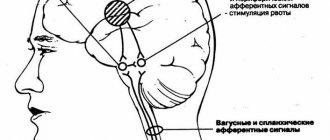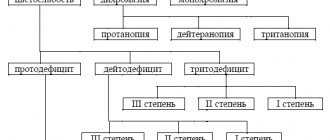Toxicosis is a concept that describes the state of poisoning of the body with poisons, toxins and other substances. The first signs of poisoning are nausea and vomiting, which are also present in the lives of many pregnant women. Therefore, the term “toxicosis” appeared, meaning a special condition of the expectant mother, which is characterized by a general deterioration in well-being.
Symptoms of toxicosis
Food preferences change sharply, there is increased sensitivity to smells, nausea, irritability, and you constantly want to sleep.
Uncontrollable salivation, low-grade fever, and vomiting occur less frequently. Usually this condition takes a woman by surprise. She needs to continue working, taking care of her family, she has a lot of things planned. With this she goes to the doctor, already pretty tired and with a sad look. And we begin to figure it out.
Firstly, toxicosis does not torment everyone. Some people simply eat everything and do not gain weight, or even lose weight, and this is where their toxicosis manifests itself. Such women are lucky. Although they also manage to worry about this, since they have heard enough “how it should be” from their friends.
Secondly, the severity of toxicosis depends on the state of the nervous system, lifestyle and the “similarity” of the baby to the mother in protein composition.
And here's more about this.
How can a gynecologist help you at the Diana Clinic?
In our clinic, highly qualified specialists in various specialized fields are waiting for you. We have a laboratory with the ability to conduct research and tests of any complexity and an ultrasound diagnostic room, where a new 3.4 D ultrasound machine is installed.
We offer:
- Development of an individual pregnancy management program for each patient with the appointment of a personal physician.
- Trimester screening examination with various programs, depending on the condition of the fetus and the pregnant woman.
- Additional studies (genetics, ultrasound) in any trimester to assess possible disorders in the fetus.
- An individual examination program and unscheduled urgent diagnostic procedures prescribed by the gynecologist leading the patient in connection with the manifestations of negative symptoms.
- Organization of specialized consultations with expert level specialists for women with complicated pregnancies, suspected fetal pathology and exacerbations of chronic diseases.
- Selection of gentle treatment for chronic and infectious diseases with minimal impact on the fetus and creation of opportunities for postpartum rehabilitation.
- Specialized preparation of patients with pathologies for childbirth and postpartum recovery.
Or sign up by phone: 8-800-707-15-60 (toll-free)
Toxicosis: why and for what?
- Nervous system. It has been noticed that toxicosis is most pronounced in anxious women, managers, doctors, teachers, that is, people with increased nervous stress. And, by the way, note that animals do not have such toxicosis as people do. They do not take on “all the world's responsibility” and therefore do not feel sick or vomit. At most, females sleep a lot and retire to save energy.
- Lifestyle. If a woman enters pregnancy not in a resourceful state, tired, exhausted, slagged from poor nutrition and lack of water, and even after some illness, poisoning, herpetic manifestations, ARVI, then the body will try to “put the woman to bed” in order to get enough sleep, rest, gain strength, eat different foods to replenish your reserves. Everything is logical. This is a smart move in the fight for survival.
- Every person has a unique genetic code, which is laid down at the moment of fertilization. And how different it will be from the mother’s code, the toxicosis will be expressed. To make it clearer, there are people who are so similar in this code and protein composition that their organs can be transplanted to each other and they will take root. Others, on the contrary, are not at all similar, and if a kidney is transplanted from such a person, for example, it will be rejected. Also here. If a child has inherited a similar genetic code, then the intoxication from its protein entering the mother’s blood will be less. And vice versa. As pregnancy progresses and the placenta forms between the body of the mother and the child, a placental barrier is formed. And toxicosis decreases: that’s why in most women it goes away by the 12th week.
In what cases during pregnancy does a gynecologist require special attention?
- Physiological pregnancy of a healthy woman
. Involves monthly consultations with the obstetrician-gynecologist leading the patient, passing mandatory tests for diseases, and preparation for childbirth. If toxicosis is present, the gynecologist will prescribe additional tests - you will need to take a biochemical blood test and a general urine test. - Pregnancy after IVF.
Requires careful screening in any case. In case of toxicosis, additional examination is necessary. In case of severe toxicosis, you will have to be treated in a hospital. - Multiple pregnancy
, due to the significant burden on the body and possible premature birth, is accompanied by enhanced obstetric control. - Pregnancy in the presence of chronic diseases
. Women with endocrine and cardiovascular diseases, disorders of the kidneys and digestive organs, and joint diseases will have to visit the gynecological clinic especially often, especially in the later stages. - Pregnancy with pathological disorders
. The presence of any pathological disorders (extragenital pathologies in a woman in labor, abnormal position of the fetus, immunological or genetic disorders identified in it) require regular monitoring and consultation with specialized specialists - an endocrinologist, geneticist, etc. In case of severe toxicosis, inpatient treatment is recommended.
How to survive?
There are no common recipes for all: we are all different and the cause of toxicosis is different for everyone. But there are still rules that help most women:
- Get more rest and sleep. Sleep whenever possible and when your body asks. A woman with severe toxicosis almost always benefits from a 5-day sick leave.
- Avoid long breaks in eating. Eat light and high-calorie foods every 3 hours. Bananas, dates, dried fruits, and sweet yogurt often help. It's not scary if there is a bun or cookies. All this is quickly digested, absorbed and gives you energy. But it is better to abstain from meat, fatty fish and multi-ingredient dishes (for example, Olivier salad). This is difficult food to digest and assimilate. You'll have to experiment with fiber. During pregnancy, constipation often occurs due to a relaxed intestine - in company with the uterus. And in this case, coarse raw fruits and vegetables will trigger peristalsis and regulate stool, but for some they cause gas formation and unpleasant colic in the stomach. So you have to try.
- Very often, nausea is especially pronounced in the morning, after sleep. This is due to the long fasting interval. To smooth out the sensation, try to have a light snack just before bed. If you get up at night to go to the toilet, chew half a banana or a cracker on the way. And in the morning, when you wake up, before getting out of bed, eat yogurt, cottage cheese, and a bun. Lie down for another 20 minutes. Then get up, have a light breakfast, and only then brush your teeth.
- The more dehydrated the body, the greater the intoxication. Start drinking warm, hot, good quality water in small sips. Definitely between meals, not during. For taste, you can first add lemon or lime, you can buy mineral water in glass at the pharmacy and drink it, preferably stirring it and releasing the gases from the bottle. But if you haven’t drank water before, or drank very little of it, then you shouldn’t suddenly start drinking more of it.
Drug treatment of early toxicosis also takes place, but only in severe forms!
And most importantly, remember, this condition, although disgusting, is temporary, absolutely safe for both you and the child. Very soon it will go away on its own. And you will no longer feel like a weakened, sick pregnant woman, but will feel your pregnancy as a big, important and very joyful “business”.
Clinical manifestations
Depending on the stage of pregnancy, the clinical manifestations and consequences of toxicosis may be different. In the sections below we will look at the symptoms of pathology in the first, second and third trimesters.
First trimester
As we have already found out, most often toxicosis begins in the period from 4 to 8 weeks of pregnancy. However, there are cases when women notice discomfort from the 1st day of a missed period or a little later - at 9 or 10 weeks.
The most common sign of pathology is vomiting. It may occur depending on the severity of toxicosis.
Table. Classification of early toxicosis:
| Severity | Characteristics of vomiting | Additional symptoms |
| Lightweight | 1-2 times a day, mainly in the morning (immediately after waking up or after breakfast). May be accompanied by a prolonged feeling of nausea throughout the day. |
|
| Average | Up to 10 times a day, throughout the day. Characterized by a constant feeling of nausea. |
|
| Heavy | Vomiting without interruption, immediately after eating or drinking. |
|
Morning “dates” with the toilet are quite common.
Note! Ptyalism (increased salivation) is another additional symptom that can accompany vomiting during pregnancy of any severity or even be an independent sign of toxicosis. With severe drooling, patients lose up to 1 liter of fluid per day, which negatively affects the water and electrolyte balance of the body.
Second trimester
As a rule, all unpleasant sensations associated with nausea and vomiting in the expectant mother disappear before 12 - 14 weeks of pregnancy. In 95% of cases, early toxicosis is completely completed by the 5th month (20th week).
However, medicine also knows cases of late toxicosis (preeclampsia), in which pathological symptoms can bother a woman at 22, 24 and even 26 weeks of gestation.
It appears:
- attacks of nausea and vomiting;
- malaise;
- the appearance of edema;
- fluctuations in blood pressure;
- a sharp decrease in vision;
- general dehydration of the body;
- starting from the 25th week of pregnancy – symptoms of nephropathy.
If there is not enough fluid in the body, all organs and systems suffer
The consequences of second trimester toxicosis can be extremely dangerous for both the expectant mother and the fetus. Without timely treatment, gestosis is often complicated by pulmonary edema, heart failure, premature birth and even the death of the patient.
Important! Late toxicosis in combination with proteinuria is an indication for immediate hospitalization of a woman in a specialized hospital.
Third trimester
Preeclampsia can also develop in the third trimester of pregnancy, starting from the 28th obstetric week and later. For some time it can be asymptomatic, so it is especially dangerous due to circulatory, water and salt balance disorders.
Symptoms of late toxicosis, starting from the 30th week of pregnancy, include:
- nausea (sometimes it persists until 36–40 weeks);
- headache, dizziness;
- arterial hypertension;
- stomach ache;
- swelling of the limbs;
- intense thirst.
Gestosis can be complicated by the development of preeclampsia and eclampsia
Note! Preeclampsia most often develops in pregnant women with arterial hypertension, kidney disease, excess weight, and also in those under the age of 18 or over 35 years.










